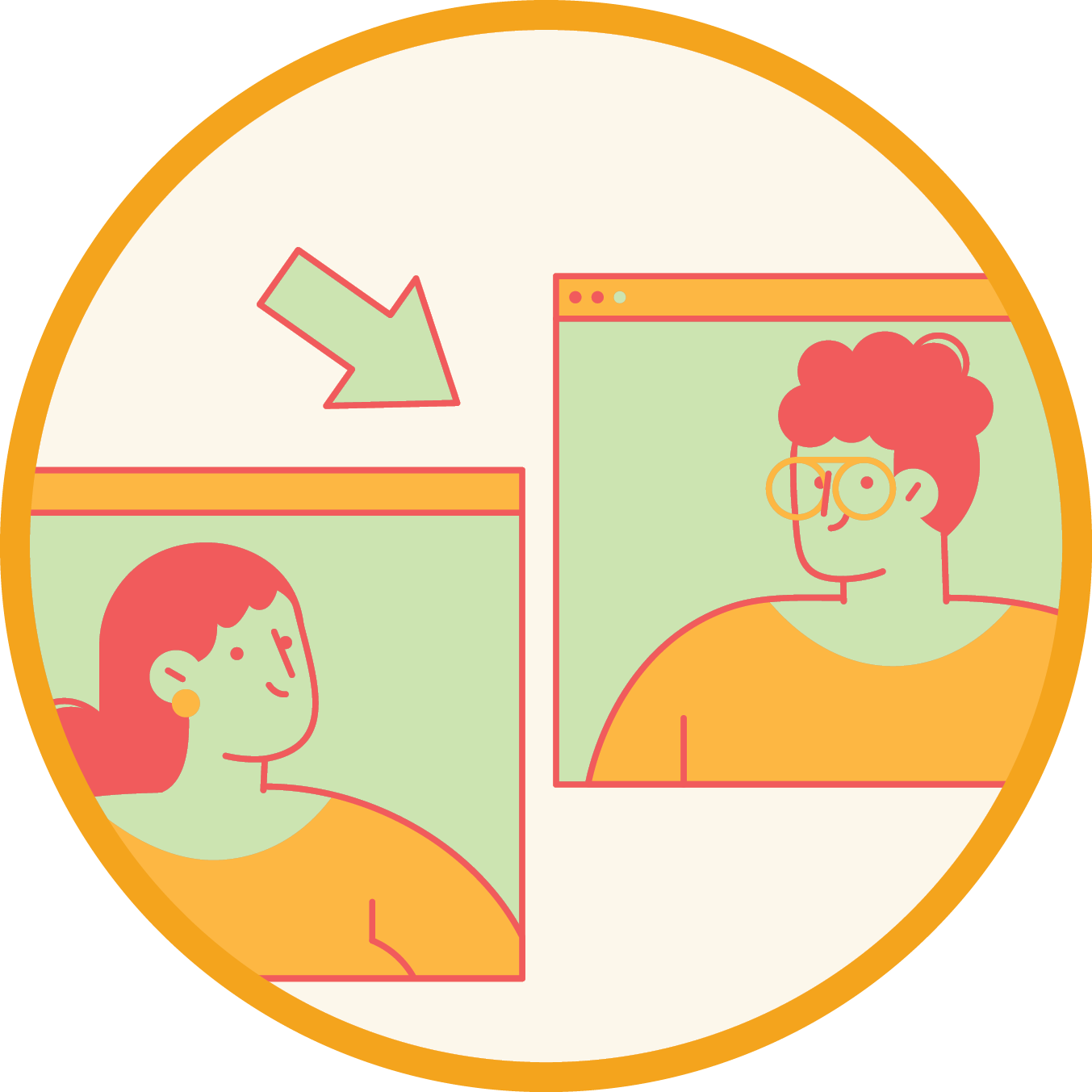

课程项目
学生将在 KTBlocks 系统上构建、测试和发布自己的游戏项目

编码平台
KTCoder 一体化编码平台支持我们的互动在线课程、专业化课程体系,以及学生对学习的热情。

学生答疑辅导时间
答疑辅导时间由我们高素质的助教团队主导。这是帮你的代码获取即时反馈的免费便捷途径。

进度报告
KTBYTE 将通过电子邮件的方式向家长发送学生的课堂表现和成绩报告

结业证书
学生完成每门课程后均可申请结业证书。
課程描述:
ACSL 是自 1978 年以来历史悠久的美国计算机科学联赛。自 2020 年起,该竞赛向全球的学生以线上参加的形式开放, 可以通过KTBYTE报名参赛。 参加该俱乐部的学生将会复习学习材料,老师对历年竞赛真题进行指导讲解,并且学生将作为 KTBYTE 团队参与竞赛。
俱乐部由获奖的优秀KTBYTE助教群带领
入班要求
初级组: 12-15岁, 7-9年级
Class Description:
ACSL 是自 1978 年以来历史悠久的美国计算机科学联赛。自 2020 年起,该竞赛向全球的学生以线上参加的形式开放, 可以通过KTBYTE报名参赛。 参加该俱乐部的学生将会复习学习材料,老师对历年竞赛真题进行指导讲解,并且学生将作为 KTBYTE 团队参与竞赛。
俱乐部由获奖的优秀KTBYTE助教群带领
Prerequisites:
初级组: 12-15岁, 7-9年级
Related Clubs
Syllabus:
Computer Number Systems
Today we went over the contest format and practiced strategies for Computer Number Systems problems. The optional homework is to try problems 3 and 4 from the Short Answer Questions. If you'd like you can also try the Recursive Functions Problems (1-2), which we'll learn about next week.
Recursive Functions
Today we cover strategies for solving Recursive Function problems and the Branching problem. We start with the Recursive Functions problems (3-4) in the short answer test from 2018-2019.
Contest 1 - What Does This Program Do? - Branching
Today we learned about analyzing and solving problems involving pseudo code! We will build off of this bit by bit in future contests.
Review for Contest 1
Today, we reviewed for the shorts portion of Contest 1 by completing miscellaneous problems that have shown up on past contests.
Contest 1 Programming
Today we practiced solving programming problems from past years' first contests.
Contest 1 Programming
Today we practiced solving programming problems from past years' first contests. Along with finishing those problems, please study for Contest 1! Review past worksheets, contests, and programming problems.
Contest 2- Prefix, Infix, Postfix Notation
Today we learned how to solve problems involving prefix, infix, and postfix notation. This type of question appears in problems 1-2 of contest 2.
Contest 2- Bit String Flicking
Today we learned about Bit-String Flicking, a concept that involves some boolean algebra along with other logical operators with 0s and 1s. The notation takes some getting used to, but once you understand it, you'll be able to solve some very interesting ACSL problems!
Contest 2- What Does This Program Do? - Looping
Today we learned about analyzing and solving problems involving pseudo code, a concept that branches off Topic 3 from Contest 1, by adding looping!
More What Does This Program Do? - Looping
Today, we continued with the topic "What Does This Program Do - Looping" to explore some more tricky problems that have come up on previous contests.
Contest 2 Programming
Today we practiced solving programming problems from past years' second contests.
Review for Contest 2 (Session 1)
Today, we reviewed for the shorts portion of Contest 2 by completing miscellaneous problems that have shown up on past contests.
Review for Contest 2 (Session 2)
Today, we continued reviewing for the shorts portion of Contest 2 by completing miscellaneous problems that have shown up on past contests.
Contest 3 - Boolean Algebra
We learned about solving problems involving the first Contest 3 topic, Boolean algebra.
Contest 3 - Data Structures
We learned about solving problems involving the second Contest 3 topic, Data structures. These include queues, stacks, and binary search trees.
Contest 3 - What Does This Program Do? - Arrays
Today, explored some rather tricky Array-Pseudocode problems that have come up on previous contests. As we've said in the past two contests with these types of problems, every problem has a trick to it! Today we will simply add another level of syntax to that idea.
Review for Contest 3 (Session 1)
Today, we reviewed for the shorts portion of Contest 3 by completing miscellaneous problems that have shown up on past contests. We also reviewed a programming problem, Stretch.
Review for Contest 3 (Session 2)
Today, we continued reviewing for the shorts portion of Contest 3 by completing miscellaneous problems that have shown up on past contests.
Contest 4 - Graph Theory
We explored Graph Theory, which involves a mathematical concept called matrix multiplication.
Contest 4 - Digital Electronics
Today, we learned about solving problems involving the second Contest 4 topic, Digital Electronics. This topic is an extension of Boolean Algebra. In fact, it’s simply a visual representation of Boolean algebra expressions using circuits, so bring all your Contest 3 Boolean algebra knowledge to the lesson!
Contest 4 - What Does This Program Do? - Strings
Today, we explored some rather tricky String-Pseudocode problems that have come up on previous contests. As we've said in the past three contests with these types of problems, every problem has a trick to it! Today we will simply add yet another level of syntax to that idea.
Review for Contest 4
Today, we reviewed for the shorts portion of Contest 4 by completing miscellaneous problems that have shown up on past contests.
ACSL Junior Finals Review Session 1
Today, we reviewed for the shorts portion of ACSL Junior Finals by completing miscellaneous problems that have shown up on past contests. We also discussed some trickier application of previous concepts already taught.
ACSL Junior Finals Review Session 2
Today, we reviewed for the shorts portion of ACSL Junior Finals by completing miscellaneous problems that have shown up on past contests.
ACSL Junior Finals Review Session 3
Today, we reviewed for the shorts portion of ACSL Junior Finals by completing miscellaneous problems that have shown up on past contests. We also practiced solving programming problems from past years' all-star contests.
课程大纲
Computer Number Systems
Today we went over the contest format and practiced strategies for Computer Number Systems problems. The optional homework is to try problems 3 and 4 from the Short Answer Questions. If you'd like you can also try the Recursive Functions Problems (1-2), which we'll learn about next week.
Recursive Functions
Today we cover strategies for solving Recursive Function problems and the Branching problem. We start with the Recursive Functions problems (3-4) in the short answer test from 2018-2019.
Contest 1 - What Does This Program Do? - Branching
Today we learned about analyzing and solving problems involving pseudo code! We will build off of this bit by bit in future contests.
Review for Contest 1
Today, we reviewed for the shorts portion of Contest 1 by completing miscellaneous problems that have shown up on past contests.
Contest 1 Programming
Today we practiced solving programming problems from past years' first contests.
Contest 1 Programming
Today we practiced solving programming problems from past years' first contests. Along with finishing those problems, please study for Contest 1! Review past worksheets, contests, and programming problems.
Contest 2- Prefix, Infix, Postfix Notation
Today we learned how to solve problems involving prefix, infix, and postfix notation. This type of question appears in problems 1-2 of contest 2.
Contest 2- Bit String Flicking
Today we learned about Bit-String Flicking, a concept that involves some boolean algebra along with other logical operators with 0s and 1s. The notation takes some getting used to, but once you understand it, you'll be able to solve some very interesting ACSL problems!
Contest 2- What Does This Program Do? - Looping
Today we learned about analyzing and solving problems involving pseudo code, a concept that branches off Topic 3 from Contest 1, by adding looping!
More What Does This Program Do? - Looping
Today, we continued with the topic "What Does This Program Do - Looping" to explore some more tricky problems that have come up on previous contests.
Contest 2 Programming
Today we practiced solving programming problems from past years' second contests.
Review for Contest 2 (Session 1)
Today, we reviewed for the shorts portion of Contest 2 by completing miscellaneous problems that have shown up on past contests.
Review for Contest 2 (Session 2)
Today, we continued reviewing for the shorts portion of Contest 2 by completing miscellaneous problems that have shown up on past contests.
Contest 3 - Boolean Algebra
We learned about solving problems involving the first Contest 3 topic, Boolean algebra.
Contest 3 - Data Structures
We learned about solving problems involving the second Contest 3 topic, Data structures. These include queues, stacks, and binary search trees.
Contest 3 - What Does This Program Do? - Arrays
Today, explored some rather tricky Array-Pseudocode problems that have come up on previous contests. As we've said in the past two contests with these types of problems, every problem has a trick to it! Today we will simply add another level of syntax to that idea.
Review for Contest 3 (Session 1)
Today, we reviewed for the shorts portion of Contest 3 by completing miscellaneous problems that have shown up on past contests. We also reviewed a programming problem, Stretch.
Review for Contest 3 (Session 2)
Today, we continued reviewing for the shorts portion of Contest 3 by completing miscellaneous problems that have shown up on past contests.
Contest 4 - Graph Theory
We explored Graph Theory, which involves a mathematical concept called matrix multiplication.
Contest 4 - Digital Electronics
Today, we learned about solving problems involving the second Contest 4 topic, Digital Electronics. This topic is an extension of Boolean Algebra. In fact, it’s simply a visual representation of Boolean algebra expressions using circuits, so bring all your Contest 3 Boolean algebra knowledge to the lesson!
Contest 4 - What Does This Program Do? - Strings
Today, we explored some rather tricky String-Pseudocode problems that have come up on previous contests. As we've said in the past three contests with these types of problems, every problem has a trick to it! Today we will simply add yet another level of syntax to that idea.
Review for Contest 4
Today, we reviewed for the shorts portion of Contest 4 by completing miscellaneous problems that have shown up on past contests.
ACSL Junior Finals Review Session 1
Today, we reviewed for the shorts portion of ACSL Junior Finals by completing miscellaneous problems that have shown up on past contests. We also discussed some trickier application of previous concepts already taught.
ACSL Junior Finals Review Session 2
Today, we reviewed for the shorts portion of ACSL Junior Finals by completing miscellaneous problems that have shown up on past contests.
ACSL Junior Finals Review Session 3
Today, we reviewed for the shorts portion of ACSL Junior Finals by completing miscellaneous problems that have shown up on past contests. We also practiced solving programming problems from past years' all-star contests.